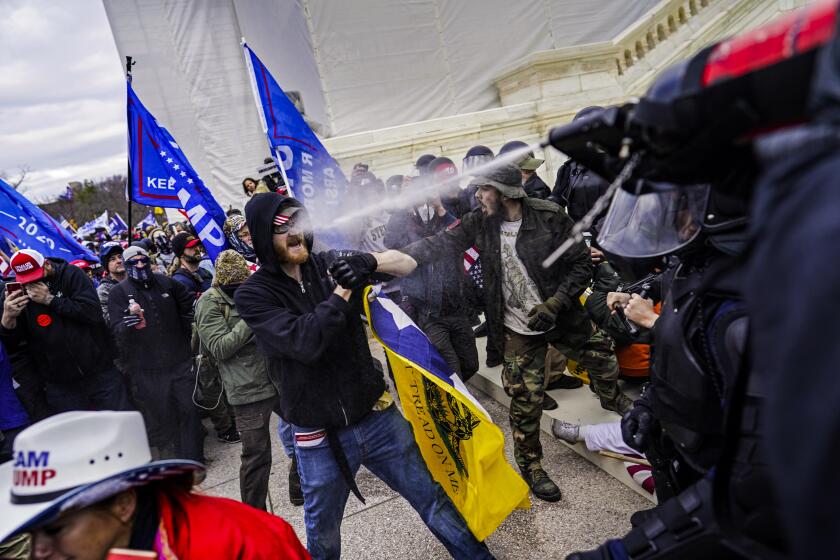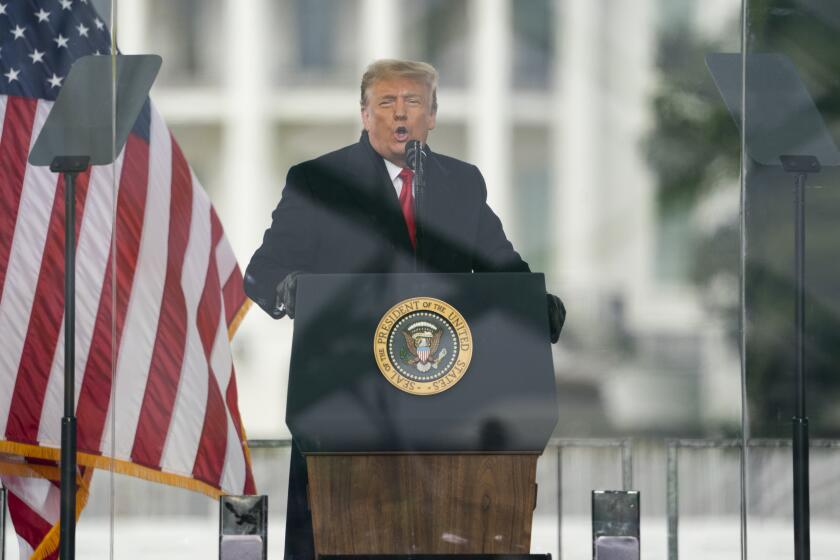Colorado Supreme Court bans Trump from the state’s ballot under Constitution’s insurrection clause

- Share via
DENVER — The Colorado Supreme Court on Tuesday declared former President Trump ineligible for the White House under the U.S. Constitution’s insurrection clause and removed him from the state’s presidential primary ballot, setting up a likely showdown in the nation’s highest court to decide whether the favorite for the Republican nomination can remain in the race.
The decision, from a court whose justices were all appointed by Democratic governors, marks the first time in history that Section 3 of the 14th Amendment has been used to disqualify a presidential candidate.
“A majority of the court holds that Trump is disqualified from holding the office of president under Section 3 of the 14th Amendment,” state justices wrote in their 4-3 decision.
The decision by Colorado’s highest court overturned a district court judge’s ruling that Trump had incited an insurrection with the Jan. 6, 2021, attack on the U.S. Capitol, but that he could not be barred from the ballot because it was unclear whether the provision was intended to cover the presidency.
The state’s high court stayed its decision until Jan. 4 or until the U.S. Supreme Court rules on the case.
“We do not reach these conclusions lightly,” the Colorado court’s majority wrote. “We are mindful of the magnitude and weight of the questions now before us. We are likewise mindful of our solemn duty to apply the law, without fear or favor, and without being swayed by public reaction to the decisions that the law mandates we reach.”
Trump’s attorneys have promised to immediately appeal any such disqualification to the nation’s highest court, which has the final say in constitutional matters.
“The Colorado Supreme Court issued a completely flawed decision tonight and we will swiftly file an appeal to the United States Supreme Court and a concurrent request for a stay of this deeply undemocratic decision,” Trump campaign spokesman Steven Cheung said in a statement Tuesday night.
Trump didn’t mention the decision during a rally Tuesday evening in Waterloo, Iowa, but his campaign sent out a fundraising email citing what it called a “tyrannical ruling.”
Republican National Committee Chairwoman Ronna McDaniel labeled the decision “Election interference” and said the RNC’s legal team intended to help Trump fight the ruling.
Trump lost Colorado by 13 percentage points in 2020 and doesn’t need the state to win next year’s presidential election. But the danger for the former president is that more courts and election officials will follow Colorado’s lead and exclude him from must-win states.
Colorado officials say the issue must be settled by Jan. 5, the deadline for the state to print its presidential primary ballots.
Lawyers for a group of Colorado voters are focusing on the January 2021 assault on the Capitol and former President Trump’s words and actions.
Dozens of lawsuits have been filed across the U.S. to disqualify Trump under Section 3, which was designed to keep former Confederates from returning to government after the Civil War. It bars from office anyone who swore an oath to “support” the Constitution and then “engaged in insurrection or rebellion” against it, and has been used only a handful of times since the decade after the war ended in 1865.
The Colorado ruling marks the first such case in which the plaintiffs succeeded. After a weeklong hearing in November, District Judge Sarah B. Wallace found that Trump had indeed “engaged in insurrection” by inciting the Jan. 6 attack on the Capitol; her ruling that kept him on the ballot was a fairly technical one.
Trump’s attorneys convinced Wallace that because the language in Section 3 refers to “officers of the United States” who take an oath to “support” the Constitution, it must not apply to the president, who is not included as an “officer of the United States” elsewhere in the document and whose oath is to “preserve, protect and defend” the Constitution.
The provision says offices covered include senators, representatives, electors of the president and vice president, and all others “under the United States,” but doesn’t name the presidency.
But the state’s highest court sided with attorneys for six Colorado Republican and unaffiliated voters who argued that it was nonsensical to imagine the framers of the amendment, fearful of former Confederates returning to power, would bar them from lower-level posts but not the highest offices in the land.
“You’d be saying a rebel who took up arms against the government couldn’t be a county sheriff, but could be the president,” lawyer Jason Murray said in arguments before the court in early December.
Trump’s attorneys argued unsuccessfully that the writers of the amendment expected the electoral college to prevent former insurrectionists from becoming president.
They also had urged Colorado’ high court to reverse Wallace’s ruling that Trump incited the Jan. 6 attack. His lawyers argued the then-president had simply been using his free speech rights and hadn’t called for violence. Trump attorney Scott Gessler also argued the attack was more of a “riot” than an insurrection.
That met skepticism from several of the justices.
“Why isn’t it enough that a violent mob breached the Capitol when Congress was performing a core constitutional function?” Justice William W. Hood III said during the Dec. 6 arguments. “In some ways, that seems like a poster child for insurrection.”
In the ruling issued Tuesday, the court’s majority dismissed the arguments that Trump wasn’t responsible for his supporters’ violent attack, which was intended to halt Congress’ certification of the presidential vote: “President Trump ... gave a speech in which he literally exhorted his supporters to fight at the Capitol,” they wrote.
Colorado Supreme Court Justices Richard L. Gabriel, Melissa Hart, Monica Márquez and Hood ruled for the petitioners. Chief Justice Brian D. Boatright dissented, arguing the constitutional questions were too complex to be solved in a state hearing. Justices Maria E. Berkenkotter and Carlos Samour also dissented.
“Our government cannot deprive someone of the right to hold public office without due process of law,” Samour wrote in his dissent. “Even if we are convinced that a candidate committed horrible acts in the past — dare I say, engaged in insurrection — there must be procedural due process before we can declare that individual disqualified from holding public office.”
The Colorado ruling stands in contrast with that of the Minnesota Supreme Court, which last month decided that the state party can put anyone it wants on its primary ballot. It dismissed a Section 3 lawsuit but said the plaintiffs could challenge next fall’s general election ballot.
In another 14th Amendment case, a Michigan judge ruled that Congress, not the judiciary, should decide whether Trump can stay on the ballot. That ruling is being appealed.
The nonpartisan group behind those cases, Free Speech For People, also filed a lawsuit in Oregon seeking to bounce Trump from the ballot there. The Colorado case was filed by the watchdog group Citizens for Responsibility and Ethics in Washington.
Both groups are financed by liberal donors who also support President Biden.
Although Biden has no role in the cases, Trump has blamed him for the lawsuits, saying the president is “defacing” the Constitution to try to end his GOP rival’s campaign.
More to Read
Sign up for Essential California
The most important California stories and recommendations in your inbox every morning.
You may occasionally receive promotional content from the Los Angeles Times.















